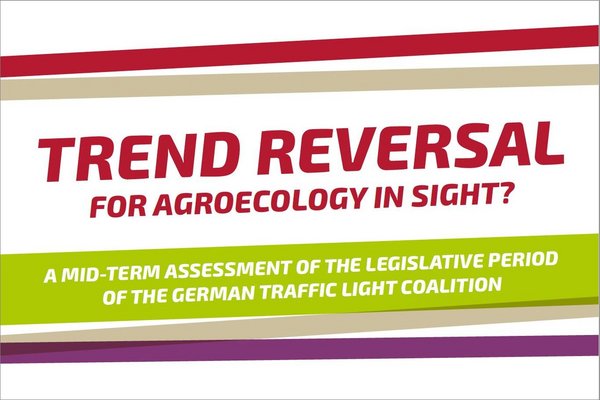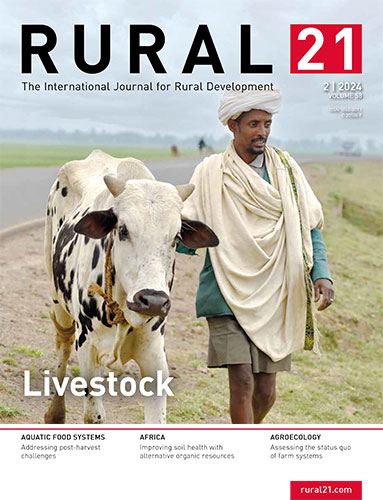 Read this article in French
Read this article in French- Share this article
- Subscribe to our newsletter
Agroecology as a guiding concept – a mid-term assessment of the “Traffic Light Coalition”
Our agriculture and food system is facing urgent challenges which require a fundamental transformation. With its holistic approach, agroecology offers solutions to the wide range of challenges our times are posing. But what about implementation and the status of agroecology in Germany’s Federal Government?
Light and shade
There are positive developments. For example, in its Coalition Agreement, the Federal Government stipulated the promotion of food security based on sustainable agroecological approaches, particularly in the area of smallholder agriculture. Furthermore, the Federal Government demonstrated particular engagement regarding agroecology in international forums and in bilateral cooperation. The right to food and its realisation have gained significance in the Federal Government, e.g. with the setting up of a section addressing the issue at the Federal Ministry of Food and Agriculture.
But retrograde steps have also been taken in policies
The opportunities to transform the agriculture and food systems were not made exhaustive use of after global crises like the COVID-19 pandemic and geopolitical tensions. Instead of comprehensive agroecological solutions, one-sided measures were taken focusing merely on short-term increases in production. One example here is the promotion of synthetic fertiliser with “green hydrogen”. Such initiatives could tie smallholders to non-sustainable chemicals and tend to be more reminiscent of the failed “Green Revolution” rather than offering long-term ecological solutions such as bio-fertiliser and agroecological approaches.
Also, the strategies of the Federal Ministry for Economic Cooperation and Development (BMZ) only insufficiently consider agroecological approaches. Neither in its policy on Africa nor in the transformation of food systems does the BMZ consistently integrate agroecology as a solution approach.
Conclusions and recommendations
In spite of some positive developments, a consistent and coherent government policy to promote agroecology is lacking. Given the impacts of the Corona pandemic, the climate crisis and other global challenges, the urgent need for a comprehensive agricultural and food reversal in trend is becoming ever clearer. Agroecology should therefore be established as a central element regarding sustainable food systems and climate protection.
To this end, the Forum on Environment and Development has formulated clear recommendations addressing the Federal Government:
- For example, it demands that agroecology be institutionally established as a section in its own right in the BMZ within this legislative period. Financial support of agroecological projects ought to be consistently and sustainably raised. This includes continuing the support of knowledge centres on organic farming and agroecology as well as the establishment of new funding programmes.
- In addition, strengthening the Round Table on Agroecology as a central platform is called for. Participation ought to be extended to various actors, and the format should be adapted to the political agenda.
- Cross-department political coherence is also important in anchoring agroecology as a central element in bilateral cooperation projects and international strategies, especially in collaboration with Africa.
- Practices such as exporting highly hazardous pesticides and deregulating genetic engineering ought to be consistently countered.
The mid-term assessment has shown that there is still a lot to do. The Federal Government has to make greater efforts and develop a coherent policy recognising and promoting agroecology as the key to coping with the global food and environmental crises. The 20-year anniversary of the Voluntary Guidelines on the Right to Adequate Food has once again demonstrated how important it is to integrate agroecological approaches in national and international policies. The Guidelines emphasise the right to adequate food and the need to promote sustainable agricultural practices. Only in this manner can a just and sustainable future for all people, especially those in the Global South, be ensured.
The authors:
Silke Bollmohr is a consultant for global agriculture and world food supply at the INKOTA network. Contact: bollmohr@inkota.de
Simone Ramones is a consultant for resource equity at the Weltfriedensdienst e.V. Contact: ramones@wfd.de
Sarah Schneider is a consultant for agriculture and world food supply at Misereor. Contact: sarah.schneider@misereor.de
More information:





Add a comment
Be the First to Comment